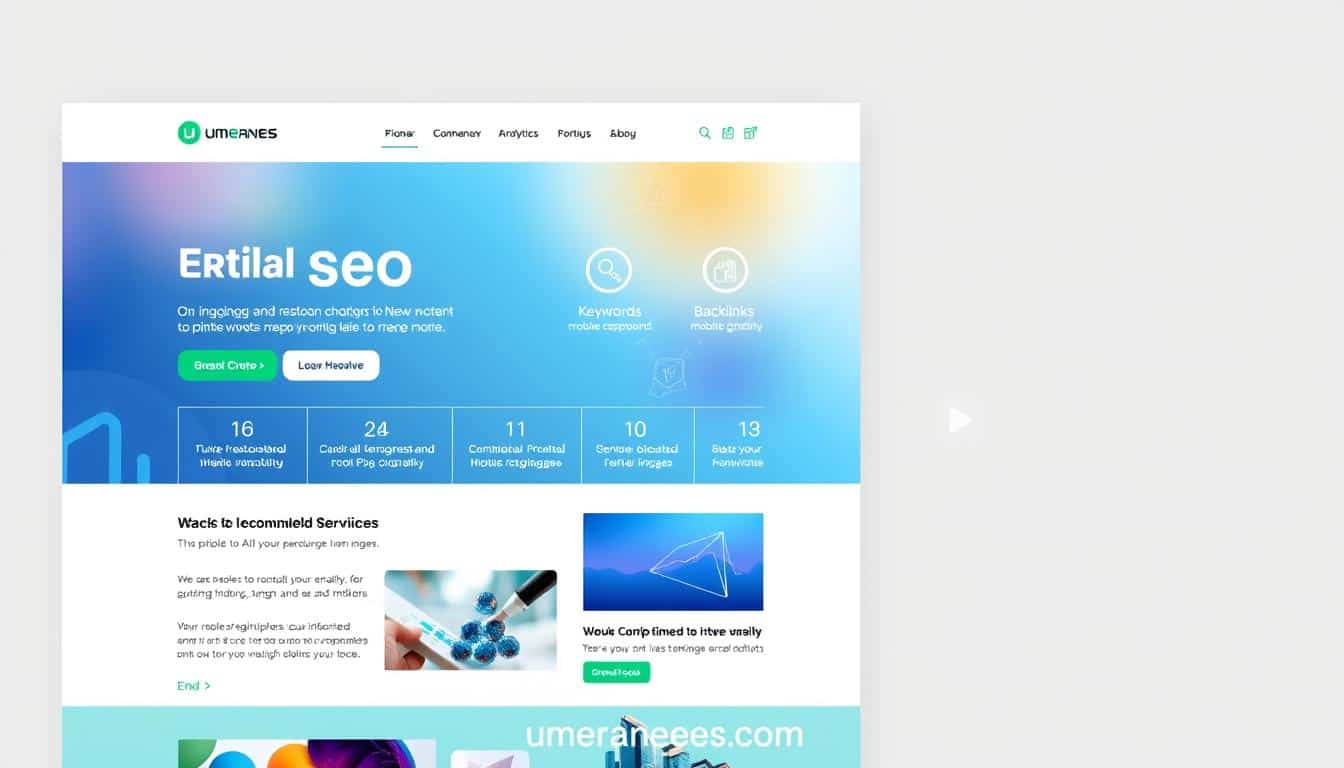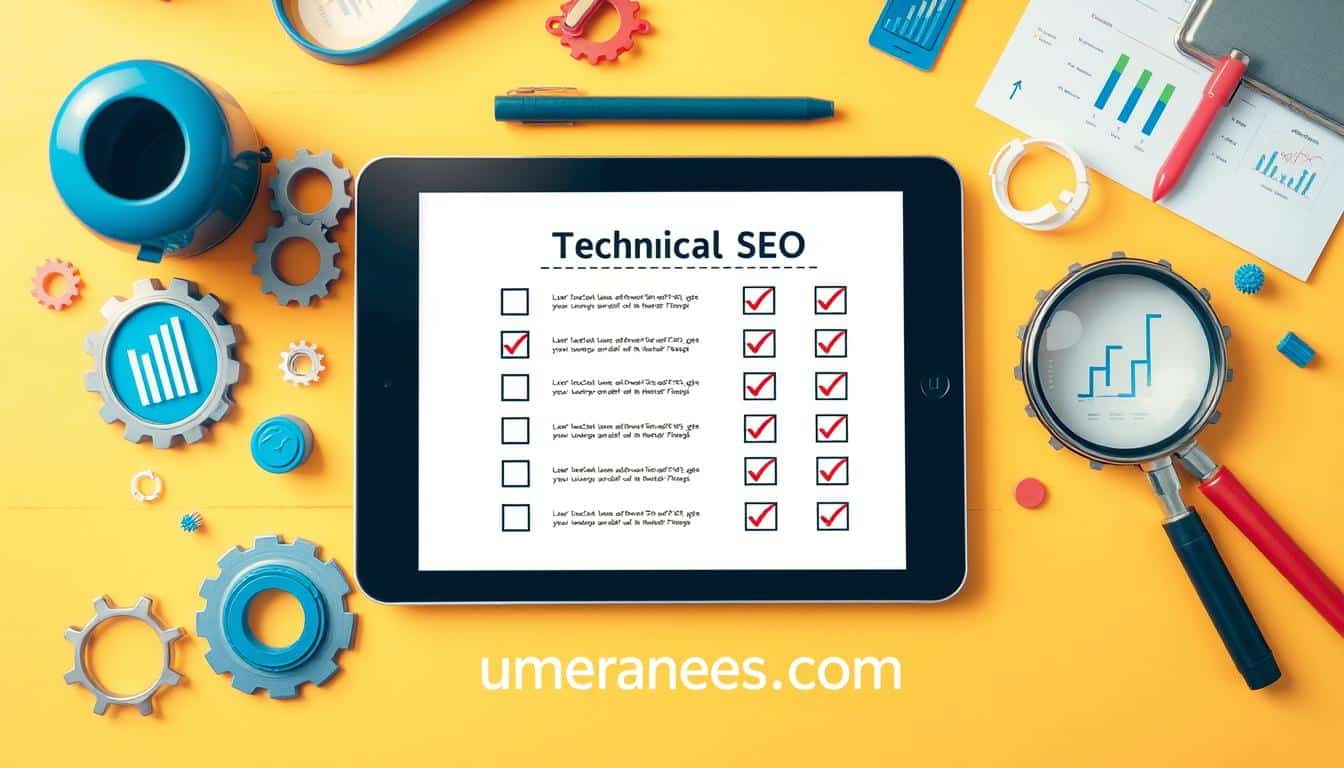Did you know 68% of online experiences start with a search engine? Today, Search Engine Optimization (SEO) is key for online success. Yet, many miss the importance of knowing on-page and off-page SEO.
On-page SEO makes your website better for search engines. It includes content, HTML tags, and site structure. Off-page SEO, on the other hand, involves activities outside your site. This includes link building and social media to boost your site’s authority.
Knowing the difference between on-page and off-page SEO is vital. By improving both, you can get better search engine rankings. This drives more traffic and helps you reach your online goals.
Key Takeaways
- On-page SEO involves optimizing elements within your website, while off-page SEO focuses on activities outside of your site.
- A comprehensive SEO strategy should include both on-page and off-page optimization techniques.
- On-page SEO helps search engines understand your website’s content and structure, improving its relevance and visibility in SERPs.
- Off-page SEO helps establish your website’s authority and credibility through link building and social media engagement.
- Understanding the difference between on-page and off-page SEO is crucial for creating an effective SEO strategy and achieving online marketing success.
Understanding the Basics of SEO
Search Engine Optimization (SEO) is key in digital marketing. It aims to make a website more visible and ranked higher in search results. The main goal is to get more organic traffic by improving on-page and off-page elements.
Search engines like Google use algorithms to rank websites. They look at content quality, site structure, and external links. Knowing these factors helps improve a website’s ranking in search results.

SEO is divided into on-page and off-page SEO. On-page SEO focuses on website elements like content and HTML tags. Off-page SEO involves activities outside the website, like link building and social media.
| On-Page SEO | Off-Page SEO |
|---|---|
| Content optimization | Link building |
| HTML tags and meta tags | Social media engagement |
| URL structure and interlinking | Guest blogging |
| Site speed and mobile-friendliness | Influencer outreach |
Both on-page and off-page SEO are vital for good rankings. On-page SEO makes a website informative and relevant. Off-page SEO boosts the website’s authority and credibility.
SEO is not a one-time event, but an ongoing process that requires continuous monitoring, analysis, and optimization to keep up with the ever-evolving search landscape and user expectations.
Understanding SEO basics and using a full strategy can boost a website’s visibility. This attracts more qualified traffic and helps achieve business goals.
What is On-Page SEO?
On-page SEO, or on page optimization, is about making your web pages better for search engines. It means improving both the content and the HTML code of your pages. This helps your site rank higher and get more relevant traffic.

On-page SEO is key to a good SEO plan. It boosts your site’s visibility and rankings. It also makes your site better for users. Let’s explore the main parts of on-page SEO.
Content Optimization
Content is at the core of on-page SEO. You need to create engaging, informative content that uses the right keywords. This attracts both search engines and users. Here are some tips for optimizing your content:
- Do thorough keyword research to find the best keywords for your audience.
- Use your target keywords naturally in your content, like in titles and headings.
- Make sure your content is easy to read and valuable to your readers.
- Use multimedia like images and videos to make your content more engaging.
HTML Tags and Meta Tags
HTML tags and meta tags are crucial for on-page SEO. They give search engines important info about your pages. This helps them index your content better. Here are some tags to focus on:
- Title tags: Use short, descriptive titles with your target keywords.
- Meta descriptions: Write compelling descriptions that encourage clicks.
- Header tags (H1, H2, H3): Use these to structure your content and highlight important points.
- Alt tags: Provide detailed alt text for images to help search engines and improve accessibility.
URL Structure and Interlinking
The way you structure your URLs and link your pages also matters for on-page SEO. Here are some tips:
- Use short, descriptive URLs that match your page’s content.
- Make your URL structure logical and easy to navigate.
- Link related pages together to help search engines understand your site’s structure.
- Use descriptive anchor text for links to provide context and help search engines.
By focusing on content, HTML tags, and URL structure, you can improve your site’s search engine performance. Remember, on-page optimization is an ongoing task. Regularly check and update your pages to stay competitive.
Key Elements of On-Page SEO
On-page SEO has many important parts that can greatly affect your website’s ranking. By focusing on these areas and using a good on page SEO strategy, you can make your site more visible in search results. This is key for getting more people to see your site.
Using the right on page SEO keywords is crucial. You need to find the best keywords for your field and use them in your titles, headers, and content. This helps your site show up better in searches.

Title tags and meta descriptions are very important for on-page SEO. Your title tag should be short, interesting, and include your main keyword. Your meta description should give a quick and enticing summary of your page’s content. These help search engines understand your page and grab the attention of potential visitors.
“The success of your on-page SEO efforts largely depends on the quality and relevance of your content. By creating valuable, informative, and engaging content that naturally incorporates your target keywords, you can attract more organic traffic and keep visitors on your site longer.”
Header tags (H1, H2, etc.) are key for organizing your content and showing search engines what’s important. Your H1 tag should have your main keyword and be your page’s headline. Other header tags help break up your content into smaller sections.
Other important on-page SEO elements include:
- Image optimization (using descriptive file names and alt tags)
- Internal linking (linking to other relevant pages on your site)
- URL structure (using short, descriptive, and keyword-rich URLs)
- Page load speed (ensuring your pages load quickly to improve user experience)
By focusing on these key elements and improving your on page SEO strategy, you can boost your website’s ranking. This will help more people find your site.
What is Off-Page SEO?
Off-page SEO is about making your website better outside of it. It’s not just about what’s on your site. It’s about making your site more trusted and valuable by what happens outside of it.

Link building is key in off-page SEO. When other good websites link to yours, it’s like a vote of confidence. The more links from quality sites, the more trusted your site looks to search engines.
Link Building Strategies
Here are some ways to build links and boost your off-page SEO:
- Guest posting: Write great articles for other sites and link back to yours in your bio or content.
- Broken link building: Find broken links and offer your content as a replacement.
- Creating valuable content: Make unique, interesting content that others want to link to.
Social Media Engagement
Social media is also important for off-page SEO. Being active on platforms related to your field helps your brand. It brings more visitors to your site and might get you links from others who share your stuff.
| Social Media Platform | Off-Page SEO Benefits |
|---|---|
| Chat with influencers, share cool stuff, and use hashtags to get seen more. | |
| Join groups, post useful info, and connect with people in your field to show you know your stuff. | |
| Make a business page, post interesting stuff, and talk to your followers to build loyalty and get shared. |
By working on link building and social media, you can make your off-page SEO strong. This will help your site rank better and get more visitors.
The Importance of Off-Page SEO
On-page SEO focuses on your website’s content and structure. Off-page SEO, on the other hand, boosts your site’s authority and credibility. It includes link building and social media engagement, which can greatly improve your search rankings.
Establishing Authority and Credibility
Off-page SEO aims to make your website a trusted source in your field. Search engines look at backlinks to judge your site’s credibility. When well-known sites link to you, it shows search engines your site is valuable.
To boost your site’s authority, try these strategies:
- Create high-quality content that attracts links
- Guest blog on relevant sites in your niche
- Join industry forums and link back to your site
- Collaborate with influencers to gain exposure
These tactics can make your website a top resource in your field. This will improve your search rankings and visibility.
Driving Referral Traffic
Off-page SEO also boosts your website’s traffic. When your content is linked from other sites, it directs users to your site. This can lead to more conversions and sales.
A good off-page SEO strategy improves your search visibility and introduces your brand to new audiences. It also drives targeted traffic to your site.
To increase referral traffic, focus on these:
| Off-Page SEO Tactic | Benefit |
|---|---|
| Building links from relevant, high-traffic websites | Attracts targeted visitors who are more likely to engage with your content and convert |
| Leveraging social media platforms to share your content | Expands your reach and drives traffic from social media users |
| Participating in online communities and forums | Establishes your expertise and attracts interested visitors to your website |
Working with an experienced off page seo agency can help you implement these strategies. This will drive targeted traffic to your site, boosting your online success.
On-Page SEO vs. Off-Page SEO: The Key Differences
Understanding the differences between on-page SEO and off-page SEO is key for website optimization. Both strategies are vital for better visibility and rankings. However, they focus on different areas of optimization.
On-page SEO deals with things you can control on your site, like content and HTML tags. It aims to make your site easy to use and valuable to your audience.
Off-page SEO, on the other hand, involves activities outside your site, like link building and social media. It aims to boost your site’s authority and credibility, leading to better rankings and more visitors.
To grasp the differences, let’s look at some key factors:
| On-Page SEO | Off-Page SEO |
|---|---|
| Content optimization | Link building |
| HTML tags and meta tags | Social media engagement |
| URL structure and interlinking | Brand mentions and citations |
| Page speed and mobile-friendliness | Guest posting and content syndication |
While on-page SEO is essential for optimizing your site for users and search engines, off-page SEO is vital for building your site’s authority and credibility.
It’s important to remember that on-page and off-page SEO are not separate. They work best together in a comprehensive SEO strategy. By using both, you can improve your site’s ranking, attract more traffic, and meet your business goals.
How On-Page and Off-Page SEO Work Together
To get the best results in search rankings, it’s key to know how on-page and off-page SEO work together. On-page SEO makes your website’s content and structure better. Off-page SEO builds your website’s reputation with backlinks and social media. Together, they help drive more traffic and make your site more visible online.
Think of on-page SEO as your website’s foundation. It makes sure your content is relevant and easy for search engines to find. This includes using the right keywords in your titles, meta descriptions, and content. Off-page SEO, on the other hand, strengthens your site’s authority. It does this by getting quality backlinks and engaging with your audience on social media.
Creating a Comprehensive SEO Strategy
To make a strong SEO plan, use both on-page and off-page tactics. Here’s how:
- Do deep keyword research to find what your audience is searching for.
- Make your website’s content and structure better with these keywords.
- Plan your content marketing to create shareable content that gets backlinks and social media love.
- Get in touch with industry influencers and websites for valuable backlinks.
- Interact with your audience on social media to get them to share your content and talk about your brand.
By using these on page and off page seo methods together, you can build a strong SEO plan. The secret to success is being consistent and creating high-quality content. Focus on making content that your audience loves and building real connections with other websites and influencers. With dedication, you’ll see your search rankings and organic traffic improve over time.
Common On-Page SEO Mistakes to Avoid
As a website owner, it’s key to optimize your on-page SEO. This helps improve your search engine rankings and brings in more organic traffic. But, even with good intentions, mistakes can happen. Here, I’ll talk about common on page seo errors and how to avoid them.
Keyword stuffing is a big mistake. It means putting your target keywords in your content too much. This makes your content hard to read and can get you penalized by search engines. Instead, focus on making content that’s engaging and naturally includes your keywords.
Duplicate content is another error. It happens when the same content is on different pages or websites. Search engines get confused and your content’s authority gets diluted. Make sure each page has unique, original content to avoid this.
Neglecting mobile optimization is a critical on page seo mistake that can have severe consequences for your search engine rankings and user experience.
Most people use mobile devices to access websites. If your site isn’t mobile-friendly, you’ll lose visitors and rank lower in search engines. Use responsive design and focus on mobile-friendly content to avoid this mistake.
Other on page seo mistakes to watch out for include:
- Poor URL structure and interlinking
- Neglecting image optimization (alt tags, file names, etc.)
- Slow page load times
- Lack of header tags (H1, H2, etc.)
- Ignoring meta descriptions and title tags
| On-Page SEO Mistake | Consequence | Solution |
|---|---|---|
| Keyword Stuffing | Unnatural, spammy content; search engine penalties | Focus on high-quality, engaging content with natural keyword incorporation |
| Duplicate Content | Diluted content authority; search engines struggle to rank pages | Ensure each page has unique, original content |
| Neglecting Mobile Optimization | High bounce rates; lower engagement; poor search engine performance | Implement responsive design; prioritize mobile-friendly content |
By fixing these common on page seo mistakes, you can boost your website’s rankings and attract more visitors. The key is to create high-quality content that naturally includes your keywords. Avoiding these pitfalls will help you provide a better experience for your visitors.
Off-Page SEO Best Practices
Off-page SEO is key to boosting your website’s search rankings and online presence. By using these techniques, you can improve your site’s visibility and attract more visitors. This complements your on-page efforts well.
Quality over Quantity in Link Building
Link building is a vital part of off-page SEO. It’s more important to get a few high-quality links than many low-quality ones. Aim for links from reputable sites in your niche.
- Create content that others want to link to.
- Collaborate with industry influencers for guest posts.
- Share insights in online forums and link back to your site.
- Use social media to share your content and engage with your audience.
Diversifying Your Backlink Profile
It’s also important to have a diverse backlink profile. This shows search engines that your site is growing naturally. Avoid using just one link building tactic.
Here are ways to diversify your backlinks:
| Off-Page SEO Technique | Description |
|---|---|
| Guest Posting | Write for other sites in exchange for a link back to yours. |
| Broken Link Building | Replace broken links with your content to get a link. |
| Infographic Promotion | Make infographics that others might want to link to. |
| Press Release Distribution | Share news about your business to get media coverage and links. |
Focus on quality links and a diverse backlink profile to boost your website’s off-page SEO.
Off-page SEO is a continuous effort. Stay updated with trends and keep working on your site’s online presence. This will help your site grow organically over time.
Measuring the Success of Your On-Page SEO Efforts
To see how well your on-page SEO works, you need to watch and understand different metrics. These metrics help you see how your site is doing and where you can get better. Here are key metrics to check your on-page SEO success:
- Organic Traffic: Watch how many people visit your site from search results. More visitors mean your SEO is getting better and your content is reaching more people.
- Keyword Rankings: Use tools like Google Search Console to see how your site ranks for important keywords. Better rankings mean your SEO efforts are working.
- Bounce Rate: Look at how many visitors leave after seeing just one page. A high bounce rate might mean your content or site isn’t meeting expectations.
- Time on Page: Check how long people stay on your pages. Longer times mean your content is engaging and valuable, helping your SEO.
To really understand these metrics, set up and check your website’s analytics tools, like Google Analytics. These tools give you detailed info on your site’s traffic and how people use it.
When you’re looking at your on-page SEO metrics, keep these tips in mind:
- Set goals based on your industry and what your competitors are doing.
- Keep an eye on your metrics and look for trends that show where you can improve.
- Use what you learn to make your content better, improve your site’s structure, and make it easier for users to navigate.
Remember, improving your on-page SEO is a continuous process. By always checking and adjusting your strategies based on data, you can keep up with the latest trends and stay strong online.
Here’s a comparison to show why tracking your on-page SEO metrics is important:
| Website A | Website B |
|---|---|
| Regularly monitors on page seo performance | Neglects to track on page seo analytics |
| Adapts content strategy based on insights | Continues with the same approach |
| Experiences steady growth in organic traffic and keyword rankings | Struggles to attract organic visitors and improve search visibility |
By focusing on tracking and understanding your on-page SEO metrics, you can make your website successful for the long term. This way, you can stay ahead in the changing world of SEO.
Tracking Off-Page SEO Progress
To make sure your off-page SEO works well, you need to watch your progress closely. Look at important metrics to see how you’re doing. This helps you find what needs work, change your plans, and get better results. Let’s look at two key parts of tracking off-page SEO: watching backlink growth and checking referral traffic.
Monitoring Backlink Growth
Backlinks are key in off-page SEO. They tell search engines your content is worth linking to. Use tools like Google Search Console, Ahrefs, or SEMrush to see your backlink growth.
When you check your backlinks, focus on these points:
- Total number of backlinks
- Number of referring domains
- Domain authority of linking websites
- Anchor text distribution
- Nofollow vs. dofollow links
Tracking these metrics helps you see if your backlink efforts are working. If backlinks start to drop or grow slowly, it’s time to rethink your strategy.
Analyzing Referral Traffic
Referral traffic shows how well your off-page SEO is doing. When other sites link to you, they help your site’s authority and bring in visitors. By looking at your referral traffic, you can see if your link building is working and find new chances to grow.
To check your referral traffic, use tools like Google Analytics. Look for these details:
| Metric | Description | Importance |
|---|---|---|
| Referral Sources | Websites sending traffic to your site | Identifies top referral sources and potential partners |
| Referral Traffic Volume | Number of visitors from each referral source | Measures the impact of each backlink on traffic |
| Bounce Rate | Percentage of visitors who leave after viewing one page | Indicates the quality and relevance of referral traffic |
| Conversion Rate | Percentage of referral traffic that completes a desired action | Evaluates the effectiveness of referral traffic in achieving business goals |
By keeping an eye on your referral traffic and looking at these metrics, you can make smart choices. This helps you improve your off page seo analytics and get more quality traffic.
Remember, tracking your off-page SEO progress is an ongoing process. By always watching your backlink growth and referral traffic, you can stay ahead and succeed in SEO for the long term.
Adapting Your SEO Strategy for Changing Algorithms
SEO is always changing, with Google updating its algorithms often. As an SEO expert, keeping up with these changes is key. This way, your website can keep its ranking and attract more visitors.
To adapt your SEO strategy, it’s important to know the latest trends and best practices. Read industry blogs, attend webinars, and talk to other SEO experts. This helps you quickly adjust your strategy when needed.
Staying Up-to-Date with SEO Trends
Here are some tips to stay ahead in SEO:
- Keep an eye on search engine announcements and blog posts for updates and new ranking factors.
- Use tools like Google Analytics and Search Console to see how your site performs after an update.
- Do regular SEO audits to make sure your site follows the latest best practices.
- Change your link building to focus on getting quality backlinks from trusted sources.
- Pay attention to how users search and what they prefer, like voice search and mobile use.
By keeping up with algorithm updates and adjusting your strategy, you can keep your site visible and attract the right visitors. SEO is a continuous process that needs ongoing learning and adjustments.
The only constant in SEO is change. Embrace it, learn from it, and use it to your advantage.
| SEO Trend | Adaptation Strategy |
|---|---|
| Mobile-First Indexing | Ensure your website is mobile-friendly and responsive across all devices. |
| Voice Search Optimization | Optimize content for conversational queries and long-tail keywords. |
| E-A-T (Expertise, Authoritativeness, Trustworthiness) | Demonstrate your expertise and build trust through high-quality, well-researched content. |
| Featured Snippets | Structure your content to answer specific questions and provide concise, informative answers. |
The Future of On-Page and Off-Page SEO
The digital world is always changing, and so is SEO. Search engines’ algorithms and online user behaviors are key to this evolution. It’s vital to keep up with new trends and predictions for on-page and off-page SEO.
User experience is becoming more important in SEO. Search engines now value website speed, mobile-friendliness, and usability more than ever. Making your site fast and easy to use will be crucial for success in the future.
Artificial intelligence and machine learning are also playing a bigger role in SEO. Search engines are getting better at understanding what users want. This means content that’s relevant and valuable will be more important than just using the right keywords.
“The future of SEO lies in creating a holistic, user-centric experience that seamlessly integrates on-page and off-page optimization techniques.” – John Mueller, Google Search Advocate
Off-page SEO will also see changes. Building quality backlinks will still be key, but the focus will shift. It’s not just about how many links you have, but where they come from. Getting links from trusted sources in your industry will be more valuable than ever.
Social media will also play a bigger role in SEO. As social platforms grow, using them to boost your brand and drive traffic will become more important. This will help your off-page SEO efforts.
To keep up with these changes, businesses need a new approach to SEO. This includes:
- Prioritizing user experience and site performance
- Focusing on creating high-quality, relevant content
- Building relationships with industry influencers and authoritative websites
- Leveraging social media to expand brand reach and drive engagement
By following these predictions and using a well-rounded SEO strategy, businesses can thrive in the digital world. This approach will help them succeed in the long run.
Balancing On-Page and Off-Page SEO for Maximum Results
To get the best search engine rankings, you need to balance on-page and off-page SEO. Many businesses focus too much on one and forget the other. This can hurt their SEO strategy.
A good strategy combines both on-page and off-page SEO. Make sure your website is easy for search engines and users to navigate. Also, build quality backlinks and engage on social media. This mix can help your site rank higher.
Remember, quality is more important than quantity in SEO. Don’t overdo it with keywords or low-quality backlinks. Instead, create valuable content that naturally includes your keywords. Also, aim for high-quality backlinks from trusted sources in your field.
A well-balanced, integrated SEO approach is the foundation of a successful online presence. By combining the power of on-page optimization with strategic off-page tactics, you can drive sustainable growth and establish your brand as a leader in your niche.
Here are some tips to balance on-page and off-page SEO:
- Regularly check your website for SEO problems like broken links or poor structure.
- Create original, valuable content that naturally includes your keywords.
- Build a diverse backlink profile by getting links from trusted sources through guest posting and other tactics.
- Engage with your audience on social media to increase brand awareness and get more visitors.
By following these tips and keeping an eye on your progress, you can create a strong SEO strategy. This will help your business succeed in the long run.
Conclusion
Knowing the difference between on page SEO and off page SEO is key. On-page SEO deals with making your website’s content and structure better. This includes things like meta tags, headers, and how often you use keywords. By making your content top-notch and optimizing it well, your site can show up higher in search results.
Off-page SEO, on the other hand, is about making your website more trusted and respected. This is done through things like getting links from other sites, being active on social media, and managing your online reputation. Getting links from good sources and engaging on social media can help your site’s authority and bring in more visitors.
To get the best results, you need to mix both on-page and off-page SEO. A good strategy includes making your site technically sound, creating great content, building links, and using social media. This way, your site can rank better, get more visitors, and have a strong online presence. Keeping up with SEO trends and adapting to new algorithms is also important. This helps your site stay competitive and visible in the digital world.







